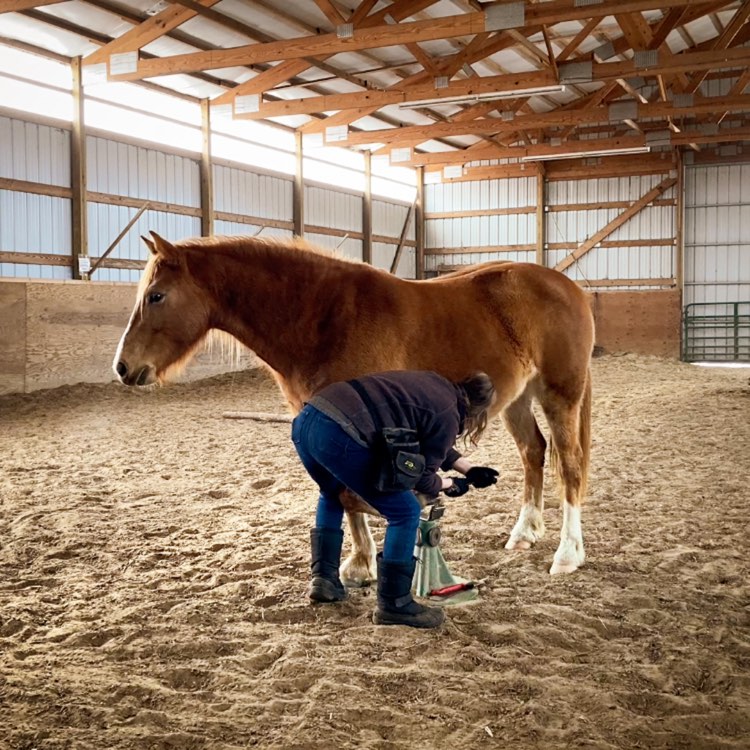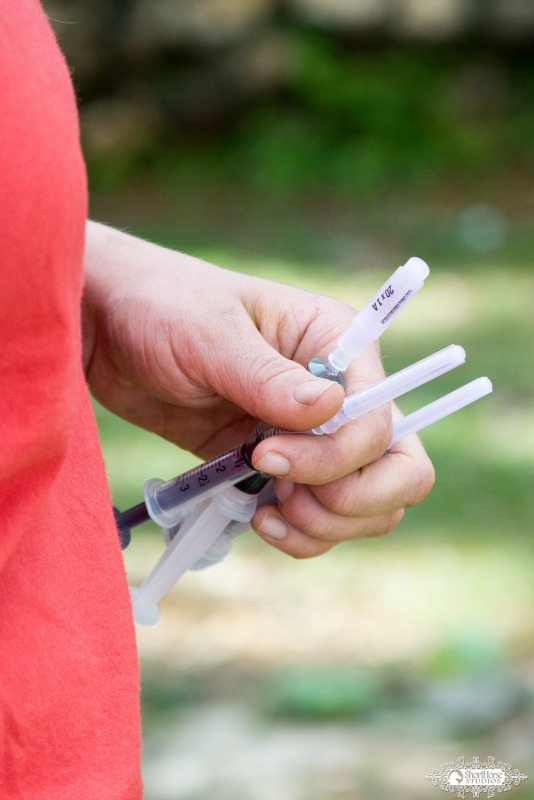husbandry
A different kind of event
Consider husbandry training as preparing for an event, like a show, but with healthcare instead of riding or in-hand work. As with all other training, cooperative behaviors for medicating, handling various parts of the horse, hoofcare, injections, etc. are taught with shaping using positive reinforcement, and horses are watched closely for signs of distress.
This is an option for clients that benefits everyone in different ways:
- Improved client/horse/professional relationships
- Improved horse welfare
- Clients have more choices of professionals if their horses are easy to work with
- More veterinary or hoofcare options may also be available with a trained horse
Of course every training situation is different, but there's usually a progression of lessons that make up an overall plan. It’s difficult to give a timeline for training. The time it takes depends on:
- The severity of the problem
- How much time is invested on a daily basis
- How skillful the training is
- Suitability of the training environment
- Whether the horse’s lifestyle supports any changes needed
- Whether you have others on board with the training plan
- Things you won’t know until you start
Sessions can even be scheduled with your healthcare professional to introduce the protocol if desired and scheduling is possible.

eye medication training
Fiona had a minor eye injury, so I had to treat it with ointment. This is only the second or third time I'd done any work on this with her. It's not perfect work, but we got the job done, no one was stressed, and our relationship remained intact.
Cooperative injection training
Twista had previously had some trouble with injections, so we thought we'd do a little work around making her comfortable with the process. Just like Fi's eye medication video, this is Twista's second or third time with the process, and her first time on the right side. She picked it up so quickly! Subsequent sessions proved that she's comfortable enough now that we should be in good shape for the real deal.
Cooperative hoofcare
Hoofcare is probably one of the most common places things go wrong with horses. Taking the time to train in short pieces really pays off in the long run (this is just over one minute, and even that is too long for some horses to start). There are lots of things that can be broken down into much smaller steps, and lots of ways of teaching and adjusting for success.
For equine healthcare professionals
Maybe this all sounds great in theory, but why should you care?
- Training is not your job, it’s the client’s job. (And my job.)
- Training makes a well-informed horse, and barring pain, a cooperative horse.
- A baseline of cooperation is useful for detecting and solving problems, since a deviation from cooperation is a good indicator of a problem emerging.
- A cooperative horse is easiest to work on, and easiest on your body.
- Easier work means you can do it more often, and for longer over time.
My goal is to make it so healthcare folks are not put in the position of working on horses that struggle with healthcare-related behaviors. We’re steadily losing vets and farriers for all kinds of reasons, most of which I have no power to change. I can't make your clients be more polite, or stop complaining about bills, or make them more respectful of your time and knowledge, or any of the other things that make health care professionals leave the field, but I can at least try to improve relationships between owners, their horses, and their healthcare professionals through the back door of training for successful cooperative care.
I'd love to collaborate with other professionals, and would love opportunities to ride along to see how you work so I can incorporate your needs into the training. After all, this has to work for you, too! If you're interested in pairing up for a day, please contact me!

Problems are often the result of unmet needs
Please note that, while many undesirable behaviors can be modified, not every behavior can be completely changed or eliminated, depending on all the factors that go into that situation. If there are current veterinary issues such as pain, injury or disease, no amount of training of any kind will make those problems go away. In that case, I may refer you to your veterinarian or other equine healthcare professional.
Occasionally, there are some behaviors that are so valuable to the horse that they're unlikely to change unless there is significant change to the horse's environment or management. If that's the case, I'm happy to help you brainstorm and problem-solve some ideas to help you and your horse find a management system that works as well as possible given each of your constraints.